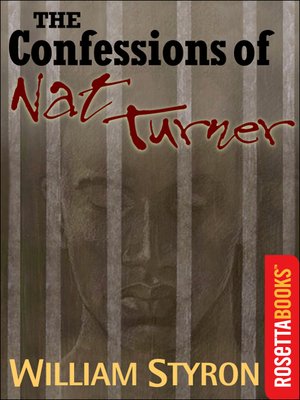
Sign up to save your library
With an OverDrive account, you can save your favorite libraries for at-a-glance information about availability. Find out more about OverDrive accounts.
Find this title in Libby, the library reading app by OverDrive.



Search for a digital library with this title
Title found at these libraries:
| Library Name | Distance |
|---|---|
| Loading... |
Few modern American novelists have dared as much as William Styron in writing The Confessions of Nat Turner. A white man and a Tidewater Virginian by birth, Styron put himself inside the life and mind of Nat Turner, the black man who led a slave rebellion in Virginia in 1831. It is a true story told as a novel, though the author prefers to call it "a meditation on history" rather than a historical novel. Many black critics scorned it when it was published, refusing to accept Styron's bold conceit, though the novel won the 1967 Pulitzer Prize in fiction and was one of the most acclaimed American novels of its time.
The Confessions of Nat Turner speaks in the first-person voice of Nat Turner himself. Styron based the novel on details of Turner's life and a pamphlet with the same title that was presented as evidence in Turner's trial. It is a shattering story that renders the horror of slavery -- so easily viewed as a faceless historical tragedy -- into unique human terms. Turner had been promised freedom by his first master but it was never granted, a taste of liberty that is unbearable in its cruelty. As a man, he can find no solace in the life that is given to him. Turner is a powerful, compelling figure, and with visions tormenting him, he inspires a small band of slaves to rise up against their masters. The rebellion is violent, resulting in the deaths of white men and women, but it is put down surely and bloodily, with an even higher casualty of black people. The fate of the rebels is inevitable, and it is from this perspective that Nat Turner seeks to understand his life.
The concentrated but extravagant richness of Styron's writing, with its high rhetorical grace, is another bold choice he made in writing The Confessions of Nat Turner, at a time when writers were embracing the idea of less being more. As in his later novel Sophie's Choice, he does not tell a story that exists only in the past. Written in the mid-1960s, this novel addresses the horrible inequities that still existed then in the lives of African-Americans, and what those inequities do to the human equation. "He has begun the common history -- ours," the novelist James Baldwin wrote when The Confessions of Nat Turner was published. The New York Times called it "a triumph," and the Wall Street Journal wrote, "William Styron has written the true American tragedy ... There can be no doubt, now, that he is the foremost writer of his generation."







